Big data analytics may unlock new approaches to treatments
By LISA EISENHAUER
Had there been a global analysis and mapping network for health data similar to the networks for weather data that can forecast and track major threats such as hurricanes, Dr. Amy Compton-Phillips believes the warning signs about COVID-19 would have been on radar screens much earlier.
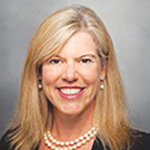
Compton-Phillips
"I think the fact that we didn't predict this pandemic is a sign that we have opportunity to improve," says Compton-Phillips, president of clinical care at Providence St. Joseph Health.
She sees Truveta, the new data-sharing partnership between her system and 13 others, as a step toward harnessing the power of data-driven predictive analytics in health care. The company will curate de-identified patient data from the health systems and sell access to researchers. Trinity Health, CommonSpirit Health and Bon Secours Mercy Health also are part of the partnership, which will compile and assist with analysis of records from tens of millions of patients from 40 states and aggregate analysis of conditions, therapies and prognosis.
With the help of artificial intelligence and machine learning, Compton-Phillips and others say the hope is that the data will lead to insights into how care is being provided and spur innovations in treatment and technology. "We thought that by working together collaboratively we could build the tools that we need to continue to advance health care and be in control of our own destiny," Compton-Phillips says.
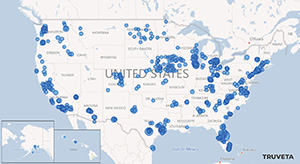
In this map of the sites of hospitals affiliated with the 14 Truveta partners, circle sizes correspond to the number of staffed beds at each facility. The map does not include clinics, nursing homes, doctors' offices and other outpatient facilities.
Truveta was announced to the public on Feb. 11. A week later SSM Health announced that it would be sharing de-identified patient data from its medical records with a research institute at Saint Louis University with a goal to "positively affect patient care and outcomes." The partnership will mean that records stripped of names, addresses and such from 5 million SSM Health patients will be available to SLU researchers.
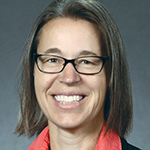
Cappellari
Dr. Ann Cappellari, chief medical information officer at SSM Health, expects the partnership to lead to advances like those that already have been made in detecting abnormalities on X-ray images with the help of computer analysis. "The ability to take gigantic pools of data and recognize trends is something humans can't do," Cappellari says.
On Feb. 23, Ascension announced that it is starting a pilot project on a new tool developed through its data-analysis collaboration with Google Health that began in 2018. The tool, called Care Studio, will allow clinicians to search information from both inpatient and outpatient Ascension facilities.
"This clinical search capability surfaces the specific information requested and additional contextually relevant information that might otherwise require significant time and effort to uncover," the system says in a blog post about Care Studio. "This contextualization will directly enhance the provider experience."
Data is in demand
While the close timing of the announcements related to data-analysis collaborations might be a coincidence, several forces appear to be behind the move toward providing researchers access to patient data.
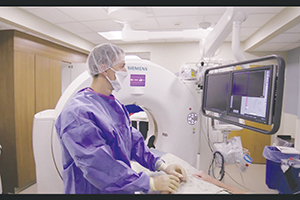
A clinician affiliated with the Saint Louis University School of Medicine looks at a screen with information from a patient's MRI. This photo was taken from a video about SLU's AHEAD Institute, a research center that is partnering with SSM Health to use de-identified patient data in the hope of advancing patient care and treatments.
Marcus Shipley, senior vice president for innovation and chief information officer at Trinity Health, says one of them is that technologies supporting analytics have evolved to a point where they can be applied effectively to medical records. The trove of data that health systems have been compiling and storing for decades is in great demand.
That data "is attracting big tech, it's attracting innovators and startups, it's getting a lot of venture funding coming into it," Shipley says.
He expects pharmaceutical, biomed and biotech companies and research institutes to be Truveta's chief customers. While some of those data buyers will be looking to turn their research into profits, he thinks the information that can be mined from the data has the potential to bring much wider benefits such as advances in epidemiology and public health.
For example, the information from the patient records could offer added depth to existing public databases to help reveal how infections spread and to make causal connections between conditions such as asthma and air pollution. "We've been sitting on this data for a long time and it's our obligation now, I believe, to put it to use to help improve quality of care in our communities and ultimately save lives," Shipley says.
Big data, big potential
Advances in analytics mean that even the "unstructured data" in patient records, such as diagnostic images, lab results and what appears in notes fields, can be mined for information that might point to patterns and fresh knowledge or targets for medical research. For Shipley, that holds the promise that Truveta's data could lead to breakthroughs that right now are beyond imagination.
"Once we get the technology up and running and we start showing what it can do, that's going to generate all kinds of innovative thinking on other possibilities that are yet to even be considered," he says.
Cappellari of SSM Health says government initiatives in recent years, especially those led by the Centers for Medicare and Medicaid Services, have resulted in the collection of more data through electronic medical records. That data is now extensive enough to point to patterns.
"Not only do we capture so much more electronically, we've done it for years now allowing some of that trending," Cappellari says. "I think we're just reaching a turning point in big data."
Current events light the fire
Current events have been another factor behind the surge in demand for health data. Compton-Phillips says the COVID pandemic "opened our eyes to the fact that health care technology is behind the rest of every other industry in using data and information to transform itself." With better and broader data analysis, she says, treatments and best practices could have been identified and shared more quickly.
The press release announcing the launch of Truveta said if the platform had existed at the onset of the COVID epidemic, the database could have helped answer questions about why African-American men were dying at such high rates from the virus. "In the U.S., why are nearly one-third of the nurses who died of COVID-19 Filipino, even though they represent 4% of the nursing population? Faster answers to these questions could have saved thousands of lives," according to the release.
The Truveta database could be used to identify, measure and monitor race-based disparities in health care and outcomes in order to advance health equity.
Accessing the assets
The value in the Truveta and SSM Health partnerships will lie in the ability to take bulk data — in this case from electronic medical records — and distill it to answer or reframe and refine complex questions.
Compton-Phillips says that at Truveta that data mining process is being run by technologists and overseen by clinicians and ethicists to ensure that the research it is used for is in the public interest.
"In order for us to be able to hold our own, and make sure we can do what our patients and our communities expect us to do — which is to protect their rights, protect their privacy, and to return proceeds back into the communities that we serve — we felt we needed to work together," Compton-Phillips says.
The SSM Health partnership has similar ethical and privacy safeguards.
While big data analytics is a newer field, Will Snyder, the co-founder of the data aggregation company Metopio, views it as an extension of the same knowledge-based processes that doctors, scientists and civic-minded leaders long have used to develop the best treatments for patients and to improve the conditions for neighborhoods and societies.
"To me this is such a natural and exciting evolution to get to where we are now, where we're thinking, 'What is it that we don't know about people and communities that we can know?' and 'Who are the partners that can help us bring change to alleviate burdens of poverty and hardship?'"
Bon Secours Mercy Health
CommonSpirit Health
Providence St. Joseph Health
Trinity Health
AdventHealth
Advocate Aurora Health
Baptist Health of Northeast Florida
Hawaii Pacific Health
Henry Ford Health System
Memorial Hermann Health System
Northwell Health
Novant Health
Sentara Healthcare
Tenet Healthcare
New platform aims to make it easier to merge, visualize data

Snyder
Will Snyder is a co-founder of Metopio, a data aggregation company that compiles data from hundreds of verified sources, most of them government agencies such as the U.S. Census Bureau, the Internal Revenue Service and the Centers for Disease Control and Prevention. Metopio provides tools to interpret and visualize the information.
With a few mouse clicks, Metopio users can layer data from various sources including their own collections; zero in on populations or geographic locations; and create maps, charts and scatterplots that show the results.
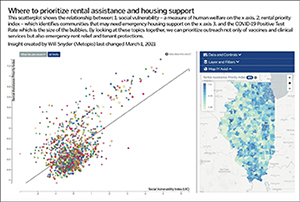
A scatterplot created by Metopio shows the relationship between social vulnerability (a measure of human welfare) and communities in high need of rental assistance because of the pandemic. The bubbles are sized by the positive COVID-19 test rate in each ZIP code. By accessing the values for all three measures, a user can quickly identify where to deploy housing resources to those in need.
"Essentially what we're trying to solve is making data, analytics and visualization easily accessible in one interface that removes risk and helps elevate the work of anyone regardless of their statistical training or data science background," says Snyder, who has years of experience in community benefit work in Catholic health care systems, including serving as chief advocacy officer at AMITA Health.
While Metopio is finding customers from various sectors including academia and real estate, Snyder sees the "sweet spot" for the platform to be at the intersection of health care providers and community-based organizations confronting issues such as gun violence and homelessness. The insights from the data can bolster their joint efforts to improve public health and address the social determinants of health, he says.
"I think the ability to interface and interact together with data is going to be really critical to then drive the decision-making and investments in programs and partnerships," Snyder says.
— LISA EISENHAUER